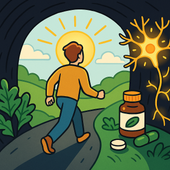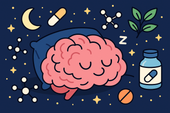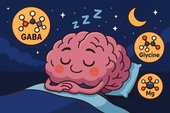How to Stay Strong During Long-Term Stress
🌧️ Introduction: When Stress Stops Being Temporary
Short-term stress can sharpen focus.
But when it stretches on for weeks, months, or years, it changes everything — your hormones, your immune system, even how your brain processes emotion.
You might feel:
Constant fatigue even after sleep 💤
Emotional flatness or irritability ⚡
Brain fog and poor concentration 🧠
Muscle tension and digestive issues 🌿
That’s chronic stress — when your body’s survival mode becomes your default mode.
The solution isn’t to “just relax.”
It’s to build physiological and emotional strength that allows you to stay calm, clear, and capable even when the pressure doesn’t stop.
In this guide, you’ll learn:
What long-term stress does to your body and brain
How to build physical and psychological resilience
Which supplements and nutrition strategies support recovery
Practical rituals that retrain your nervous system
Because staying strong under pressure isn’t about ignoring stress — it’s about mastering recovery.
Looking for supplements for This? Click here.
🧬 Part 1: Understanding Chronic Stress — The Biology of Overload

⚡ The Stress Response 101
When your brain perceives danger — financial, emotional, or physical — it activates the HPA axis (Hypothalamus–Pituitary–Adrenal).
The cascade looks like this:
1️⃣ Hypothalamus releases CRH →
2️⃣ Pituitary gland releases ACTH →
3️⃣ Adrenal glands release cortisol and adrenaline
In short doses, this helps you act fast.
But if the stressor doesn’t go away, cortisol remains elevated, disrupting nearly every system in your body.
🔄 How Chronic Stress Rewires Your Brain
Long-term stress weakens the prefrontal cortex (focus, logic) and strengthens the amygdala (fear center).
This leads to:
Overreacting to minor stressors
Trouble concentrating
Sleep disturbances
Decreased motivation
Essentially, your brain becomes better at surviving — and worse at thriving.
💣 The Physical Cost
Chronic stress increases inflammation and drains nutrients like magnesium, zinc, and B vitamins.
Over time, this can contribute to:
Fatigue and burnout
Weakened immune function
Hormonal imbalances
Digestive issues
So if you’ve been under constant pressure and feel “off,” your body isn’t broken — it’s exhausted.
🌿 Part 2: Building Physiological Strength — The Foundation of Resilience
You can’t think your way out of chronic stress if your biology is collapsing.
Start by strengthening your stress physiology — your body’s ability to handle pressure without overreacting.
🌬️ 1️⃣ Regulate Through Breath
Your breath is the most direct tool to influence the nervous system.
Try this:
Inhale through your nose for 4 seconds
Hold for 2
Exhale slowly through your mouth for 6–8
Do this 3–5 times when you feel tense.
Long exhales signal safety to your vagus nerve, dropping heart rate and cortisol.
☀️ 2️⃣ Get Sunlight and Movement Daily
Morning light stabilizes your circadian rhythm, improving cortisol balance and mood.
Pair it with light exercise (walks, mobility work, yoga) to metabolize stress hormones naturally.
Move your body to move your mood.
💧 3️⃣ Hydration + Electrolytes
Chronic stress increases water loss through cortisol-driven diuresis.
Even mild dehydration worsens fatigue and irritability.
Add a pinch of sea salt or electrolyte mix to your morning water for better hydration and focus.
💤 4️⃣ Prioritize Deep Sleep
Sleep is your nervous system’s reset button.
But under chronic stress, cortisol suppresses melatonin — making it harder to fall asleep.
Reset with:
Magnesium glycinate (200–400 mg)
Glycine (3 g before bed)
No screens 1 hour before sleep
Dark, cool room (18–20°C)
Sleep is not a luxury — it’s recovery time for your resilience machinery.
🧘 Part 3: Strengthening Emotional Resilience
Long-term stress tests emotional boundaries.
You can’t stop challenges from coming — but you can train your brain to recover faster.
🧩 1️⃣ Practice Emotional Labeling
When stress spikes, name what you feel.
“I’m overwhelmed.”
“I’m anxious about this project.”
This simple act activates the prefrontal cortex, reducing amygdala activity.
It turns chaos into clarity.
💬 2️⃣ Reframe Your Narrative
Instead of “I can’t handle this,” try:
“This is difficult, but I’m adapting.”
Cognitive reframing shifts your brain chemistry — literally reducing cortisol release by reinterpreting meaning.
❤️ 3️⃣ Connect with Supportive People
Social connection regulates your nervous system better than isolation ever will.
Even 10 minutes of genuine conversation boosts oxytocin, the antidote to stress hormones.
Isolation amplifies suffering; connection diffuses it.
🧘 4️⃣ Practice Controlled Exposure
Just like muscles, your stress tolerance grows through gradual exposure.
For example:
Cold showers 🧊
Breath-hold exercises 🌬️
Speaking in uncomfortable situations 💬
These small doses of stress train your nervous system to handle bigger waves calmly.
🍽️ Part 4: Nutrition and Supplements for Long-Term Stress
Your diet and micronutrients play a massive role in resilience.
Chronic stress depletes your body — the right nutrition replenishes it.
🥦 1️⃣ Eat for Blood Sugar Stability
Unstable glucose triggers cortisol spikes.
Balance each meal with:
Protein (fish, eggs, beans)
Healthy fats (avocado, olive oil)
Fiber (vegetables, oats, legumes)
Skip excessive caffeine and refined sugar — they crash the very system you’re trying to stabilize.
💊 2️⃣ Key Supplements for Long-Term Stress
🌿 Adaptogens — Nature’s Stress Modulators
Adaptogens help your body adapt to stress by normalizing cortisol and boosting energy without overstimulation.
Top options:
Ashwagandha (300–600 mg/day): lowers cortisol
Rhodiola rosea (200–400 mg/day): improves endurance and focus
Schisandra (300 mg/day): boosts stamina and liver detox
Reishi mushroom (1–2 g/day): calms and restores sleep
Stack them intelligently (Ashwagandha + Rhodiola in AM, Reishi in PM).
💪 Magnesium — The Relaxation Mineral
Magnesium supports over 300 processes, including muscle relaxation and GABA signaling.
Deficiency leads to anxiety, fatigue, and insomnia.
Best forms:
Glycinate (for calm)
L-threonate (for brain focus)
💊 Dose: 200–400 mg daily.
🧠 Omega-3 Fatty Acids — Brain and Mood Protector
Omega-3s strengthen neural membranes and reduce inflammation.
They stabilize mood and help you recover faster from mental exhaustion.
💊 Dose: 1–2 g combined EPA + DHA daily.
🌼 B Vitamins — Adrenal Support
B-complex vitamins fuel your stress-response system and neurotransmitter production.
Focus on:
B5 (pantothenic acid) — adrenal function
B6 (pyridoxal-5-phosphate) — GABA synthesis
B12 + Folate — energy and mood regulation
💊 Dose: High-quality B-complex daily.
🍵 L-Theanine — Calm Focus
L-theanine increases alpha brain waves and reduces anxiety without drowsiness.
💊 Dose: 200–400 mg daily.
Perfect for entrepreneurs, students, and anyone juggling long-term mental load.
🌸 Saffron Extract — Mood Brightener
Saffron balances serotonin and dopamine, improving optimism and resilience.
💊 Dose: 15–30 mg/day (Affron® extract preferred).
🩵 Bonus: Glycine + Magnesium at Night
Together, these support deep sleep and overnight nervous system repair — your best defense against chronic overload.
Looking for supplements for This? Click here.
🧠 Part 5: Mental Frameworks That Keep You Strong
Physical tools help — but mindset decides how you interpret stress.
Here are the mental frameworks of resilient people who thrive long-term.
🧭 1️⃣ Shift from Resistance → Response
Resisting stress keeps your body in fight mode.
Responding calmly signals control.
“This is here — I can choose my next step.”
🔄 2️⃣ Accept Cyclic Performance
You can’t be at 100% all the time.
Resilience means knowing when to recover strategically, not waiting until you crash.
Build your schedule like an athlete:
Peak days (deep work)
Light days (maintenance)
Recovery days (rest and reflection)
💡 3️⃣ Focus on Process, Not Outcome
Stress spikes when you chase uncontrollable results.
Shift your energy toward controllables — effort, consistency, learning.
That mindset makes setbacks data, not personal failure.
🌙 4️⃣ Daily “Nervous System Hygiene”
Simple rituals restore calm:
Breathwork or meditation (5–10 min)
Stretching or walking outdoors
Gratitude journaling
Tiny acts of regulation compound into major emotional strength.
Want to try Breathwork? Click Here.
💬 Part 6: The Resilience Ritual (Daily Practice)
A 24-hour cycle to stay strong during long-term stress:
| Time | Practice | Duration | Why It Works |
|---|---|---|---|
| 🌅 Morning | Sunlight + Hydration + Breathwork | 10–15 min | Sets cortisol rhythm |
| ☕ Mid-Morning | Focus block + L-theanine | 90 min | Builds cognitive strength |
| 🥗 Midday | Protein meal + light movement | 30 min | Reduces stress hormones |
| 🌇 Evening | Magnesium + reflection journaling | 15 min | Resets nervous system |
| 🌙 Night | Glycine + screen-free time | 30 min | Deep recovery |
💪 Part 7: When Stress Feels Endless — How to Recover

If you’ve been under chronic pressure for months or years, start gently.
Overreaching for productivity while burned out deepens the damage.
🧩 Step 1: Stabilize Physiology
Prioritize sleep, magnesium, and hydration.
You can’t think straight in survival mode.
🌿 Step 2: Reintroduce Adaptogens Gradually
Start with ashwagandha or reishi before adding stimulating adaptogens like rhodiola.
Give your system 2–3 weeks to recalibrate.
💬 Step 3: Reconnect Emotionally
Chronic stress disconnects you from joy and relationships.
Schedule simple moments of connection — calls, laughter, pets, nature.
Healing starts with presence, not performance.
🌈 Step 4: Rebuild Purpose Slowly
When you’ve been overwhelmed, don’t jump to “big goals.”
Focus on values-driven micro-wins.
“Today, I kept a promise to myself.”
“I rested when I needed to.”
Each small act of integrity rebuilds internal trust — the core of resilience.
🌞 Part 8: The Science of Long-Term Strength
Research shows stress resilience is trainable.
Exercise boosts BDNF (brain growth factor)
Mindfulness strengthens the prefrontal cortex
Adaptogens balance cortisol rhythms
Sleep repairs neural and immune systems
Over months, these compound effects shift your baseline from chaos → calm capacity.
You’ll still face storms, but your nervous system will stop breaking from them.
🌿 Final Thoughts: Strength Is a Skill, Not a Personality Trait
Long-term stress doesn’t mean you’re weak — it means your system has been overclocked.
Staying strong isn’t about denial or toxic positivity.
It’s about learning the rhythms of recovery, nutrition, and emotional regulation that make you anti-fragile — stronger because of what you’ve endured.
So breathe deeply.
Rest deliberately.
Fuel your body like it’s your foundation.
Because it is.
You can’t always control the stress —
but you can control your strength. 🌿💫
Looking for online therapy ? Click Here.
📚 References
McEwen, B. “Stress, Adaptation, and the Brain.” Annual Review of Neuroscience, 2007.
Huberman, A. “Tools for Managing Stress.” Huberman Lab Podcast, 2023.
Panossian, A. “Adaptogens and Cortisol Modulation.” Phytomedicine, 2021.
Walker, M. Why We Sleep. Scribner, 2017.
Sarris, J. “Nutritional Psychiatry for Stress and Resilience.” World J. Psychiatry, 2019.
Kimura, K. “L-Theanine and Alpha Brain Waves.” Biological Psychology, 2007.
Tedeschi, R., Calhoun, L. “Post-Traumatic Growth and Resilience.” Psychological Inquiry, 2004.
Peuhkuri, K. “Diet and Sleep Regulation.” Nutrients, 2012.
Sapolsky, R. Why Zebras Don’t Get Ulcers. Holt Paperbacks, 2004.
Arnsten, A. “Stress Signaling and Cognitive Control.” Nature Reviews Neuroscience, 2009.
Related Posts
-

How to Measure Your Emotional Growth Over Time
Emotional growth can’t be measured on a scale — but it can be tracked through awareness, regulation, and reflection. Learn how to monitor your emotional evolution using journaling, biofeedback, and science-backed metrics for real progress. 💫
-

The Connection Between Creativity and Resilience
Creativity and resilience share the same roots — adaptability, flexibility, and imagination. Learn how creative expression rewires your brain for strength, helping you transform stress into growth through neuroscience, art, and self-reflection. 🌿
-

Why Cycling Supplements May Improve Long-Term Resilience
Your body adapts to everything — even supplements. Discover why cycling your supplements helps prevent tolerance, boost energy naturally, and build lasting resilience by aligning with your body’s biological rhythms. 🌿
-

The Role of Biofeedback in Emotional Strength
Learn how biofeedback bridges mind and body — helping you monitor heart rate, breath, and brain activity to build emotional strength, resilience, and calm under pressure. See how science meets mindfulness for lasting control. 🌿
-

Resilience Training for Entrepreneurs
Entrepreneurship isn’t just about strategy — it’s about stamina. Discover how resilience training helps founders stay calm, clear-headed, and adaptable under pressure through neuroscience-backed habits, emotional regulation, and smart supplementation. 🌿
-

How Nootropics Can Boost Emotional Control
Emotions don’t have to control you. Discover how nootropics like L-theanine, ashwagandha, saffron, and omega-3s help balance brain chemistry, improve focus, and strengthen your ability to stay calm and composed under stress. 🌿
-

Stacking Adaptogens for Maximum Resilience
Adaptogens are nature’s stress shield — helping you stay calm, energized, and clear even under pressure. Learn how to stack herbs like ashwagandha, rhodiola, reishi, and schisandra for maximum resilience, balance, and long-term vitality. 🌿
-

Post-Traumatic Growth and Supplements That Support It
After trauma, true healing means more than survival — it’s transformation. Learn how post-traumatic growth happens in the brain and body, and explore natural supplements like magnesium, ashwagandha, saffron, and omega-3s that support resilience, clarity, and emotional repair.
-

How to Regain Focus After Emotional Stress
After emotional stress, your nervous system feels frayed — your focus fades, thoughts race, and calm seems impossible. Learn how to restore balance, rebuild concentration, and retrain your brain for clarity and peace through evidence-based mind–body tools. 🌿
-

The Future of Sleep Supplements
The future of sleep supplements is here — where science meets nature. Discover how next-generation formulas use adaptogens, amino acids, and biotech innovations to support deep, restorative sleep without dependency. 🌙
-

Emerging Research on Sleep and Nootropics
Can nootropics help you sleep better? Discover how compounds like L-theanine, magnesium threonate, ashwagandha, and Alpha-GPC influence neurotransmitters, circadian rhythm, and brain recovery — bridging the gap between smarter days and deeper nights. 🌙
-

New Herbal Extracts for Deep Sleep
Discover the next generation of herbal extracts for deep sleep — from saffron and magnolia to jujube and lemon balm. Learn how these plant-based compounds calm the nervous system, balance cortisol, and promote truly restorative rest. 🌙
-

Sleep Biohacking: What Works and What Doesn’t
Biohacking your sleep can sound futuristic — from red light therapy to wearables and supplement stacks. But which hacks actually help, and which are just hype? Discover the science-backed sleep strategies that truly improve rest, recovery, and brain health. 🌙
-

Sleep Support for People with Anxiety Disorders
💭 A restless mind can keep you up all night — thoughts spinning, heart racing, and peace feeling far away. Learn how to quiet overthinking, regulate your nervous system, and create a nightly ritual that teaches your brain to let go and rest deeply. 🌙
-

How to Fall Back Asleep After Waking Up
Waking up in the middle of the night? Learn how to fall back asleep quickly and calmly using breathing techniques, stress-reducing rituals, and natural supplements like magnesium and glycine. Restore your body’s rhythm and wake up feeling refreshed.
-

The Role of Omega-3s in Sleep Quality
-

Stacking GABA and Glycine for Deeper Rest
Discover how stacking GABA and glycine can help you achieve deeper, more restorative sleep. Learn how these calming amino acids work together to relax your mind, soothe your body, and improve overall sleep quality—naturally and safely.
-

Overcoming Jet Lag with Supplements
✈️ Jet lag doesn’t have to ruin your trip! Discover how supplements like melatonin, magnesium, L-theanine, and tart cherry can help you reset your body clock faster, reduce fatigue, and recover energy naturally after long flights. 🌙
-

Managing Sleep During Times of Stress
Feeling wired and restless? Learn how to manage sleep during stressful times through nutrition, breathwork, and natural supplements like magnesium and L-theanine. Discover how to calm your nervous system and restore deep, peaceful rest—even when life feels overwhelming.
-

The Role of Magnesium for Night Cramps
Night cramps keeping you awake? Discover how magnesium helps relax muscles, balance electrolytes, and prevent painful spasms. Learn which forms work best, how to take them, and how to pair them with other nutrients for cramp-free, peaceful sleep.
-

Supplements That Reduce Nighttime Awakenings
🌙 Discover science-backed supplements that help you stay asleep through the night. From magnesium and L-theanine to glycine and ashwagandha, learn how these natural compounds calm your nervous system, balance cortisol, and prevent 2 a.m. wake-ups for deeper, more restorative rest.
-

Nootropics That Promote Calm and Rest
Explore the world of calming nootropics — natural brain enhancers that promote relaxation, better focus, and deeper rest. Learn how L-Theanine, magnesium, ashwagandha, and other adaptogens help balance your nervous system, reduce stress, and support restorative sleep.
-

Best Natural Supplement Stack for Sleep
Discover the best natural supplement stack for deep, restorative sleep. Learn how nutrients like magnesium, L-theanine, glycine, and calming herbs such as chamomile and ashwagandha work together to relax your body, calm your mind, and improve sleep quality—naturally and safely.
-

Combining L-Theanine and Magnesium for Sleep: A Calm Night, Naturally
Discover how combining L-Theanine and Magnesium can help you drift into deep, restorative sleep. Learn how this natural duo calms the mind, relaxes the body, and supports your nervous system—without grogginess the next morning.
-

How to Sleep Better After Intense Workouts
Struggling to fall asleep after a tough workout? Learn how to optimize your post-training recovery with nutrition, hydration, and science-backed sleep strategies. Discover how to calm your nervous system, balance hormones, and wake up fully recharged for your next session.
-

Ashwagandha and Valerian: A Bedtime Combo for Deep Rest and Emotional Reset
Discover the calming synergy of Ashwagandha and Valerian root, two natural sleep aids that help quiet the mind, ease anxiety, and promote deeper rest. Learn how this herbal duo supports the nervous system, balances stress hormones, and restores emotional peace — without next-day grogginess.
-

How to Create a Resilience-Boosting Diet
Discover how to build emotional and physical strength from the inside out with a resilience-boosting diet 🍎. Learn which foods stabilize your mood, how supplements like magnesium and omega-3s strengthen your stress response, and why pairing nutrition with breathwork and therapy creates lasting calm, focus, and vitality 🌿💪.
-

Best Teas and Herbal Blends for Calmness: Nature’s Way to Restore Inner Peace
Ashwagandha, the ancient adaptogenic herb, helps your body find balance during stress. Known as “Indian ginseng,” it supports cortisol regulation, boosts energy, and restores calm clarity. Discover how this powerful root promotes resilience, emotional balance, and steady vitality — one cup at a time. 🌸
-

Parenting and Emotional Strength: How to Raise Children Without Losing Yourself
Empathy is the bridge that connects hearts — the quiet power to understand, feel, and support another’s emotions without judgment. Learn how empathy strengthens relationships, enhances communication, and cultivates deeper compassion in everyday life. 🌿
-

How to Bounce Back from Public Failure: Reclaiming Confidence, Purpose, and Power
Visualization is more than imagination — it’s brain training for resilience. By picturing calm, success, or healing, you activate the same neural pathways as real experience. Learn how daily visualization rewires your brain for confidence, emotional balance, and recovery from stress. ✨
-

Coping with Financial Stress Through Resilience: How to Stay Grounded When Money Feels Tight
Body awareness is the foundation of emotional resilience. By tuning into your body’s signals — tension, fatigue, or calm — you learn to recognize stress before it overwhelms you. Discover how mindfulness, gentle movement, and breathwork can deepen your connection with your body and restore balance from the inside out. 🧘
-

How to Stay Positive During Chronic Illness: A Guide to Emotional Strength and Hope
Creativity is more than art — it’s a form of healing. Whether through painting, writing, music, or small acts of expression, creativity helps release emotion, calm the nervous system, and reconnect you to joy. Discover how to use creativity as a tool for emotional balance, resilience, and self-discovery. 🌿
-

Resilience Tips for Caregivers: How to Stay Strong While Caring for Others
Joy isn’t the absence of pain — it’s the quiet strength to find light even in challenging times. Cultivating joy through small daily moments restores balance, releases stress, and reminds you of life’s beauty. Learn how to reconnect with authentic happiness, rebuild emotional energy, and nurture your nervous system through gratitude, presence, and play. 🌿
-

Building Resilience After a Breakup: How to Heal, Rebuild, and Rise Stronger
Social connection is one of the strongest predictors of emotional resilience. During difficult times, genuine relationships act as anchors — calming the nervous system, reducing stress hormones, and helping you regain perspective. Learn how cultivating real human connection can strengthen your mind, heart, and overall well-being. 🌿
-

How to Stay Emotionally Strong During Job Loss
Your emotions are powered by brain chemistry — a delicate balance of neurotransmitters like serotonin, dopamine, and cortisol. When these chemicals work in harmony, you feel calm, focused, and resilient. Learn how daily habits, nutrition, and mindfulness can support your brain chemistry and boost emotional well-being naturally. 🌿
-

The Role of Hormones in Emotional Stability: How Your Chemistry Shapes Your Calm
Hormones shape more than your body — they shape your emotions, resilience, and sense of calm. From cortisol to serotonin, these chemical messengers influence how you react to stress, connect with others, and recover from challenges. Learn how to balance your hormones naturally to build lasting emotional stability and harmony within. 💫
-

Mitochondria and Emotional Energy: The Cellular Power Behind Your Mood
Breathwork is one of the most powerful tools for emotional regulation and cellular balance. Through intentional breathing, you can calm your nervous system, increase oxygen flow to the brain, and even support mitochondrial energy. Learn how conscious breathing connects body and mind — transforming stress into presence and emotional strength. 🌿
-

Inflammation and Its Impact on Mood Resilience: The Silent Link Between Body and Mind
Inflammation doesn’t just affect the body — it impacts the mind. Chronic inflammation alters brain chemistry, depletes serotonin, and makes emotional recovery harder. Learn how calming inflammation through nutrition, mindfulness, and sleep can restore balance, resilience, and a renewed sense of emotional strength. 💫
-

How Antioxidants Protect Emotional Well-being: The Hidden Link Between Oxidative Stress and Mental Health
Antioxidants do more than protect your body — they defend your mind. By neutralizing oxidative stress, antioxidants support serotonin, dopamine, and brain energy pathways that keep you calm, focused, and emotionally balanced. Discover how foods like berries, green tea, and dark chocolate nourish your brain, boost mood, and strengthen resilience from the inside out. 🌿✨
-

The HPA Axis and Emotional Health: The Hidden Bridge Between Stress and Mind
Neuroplasticity — the brain’s ability to rewire and adapt — is the foundation of emotional healing and resilience. When you face stress, trauma, or change, your neural pathways can reshape themselves to support new patterns of calm, focus, and self-awareness. Learn how daily practices like mindfulness, therapy, and breathwork strengthen neuroplasticity to transform emotional pain into personal growth. 🌸
-

Why Cortisol Control Is Key to Resilience: Mastering Stress to Build Emotional Strength
Controlling cortisol — the body’s main stress hormone — is the secret to lasting resilience. When cortisol levels stay balanced, your mind becomes clearer, emotions steadier, and energy more sustainable. Learn how breathwork, mindset shifts, adaptogens, and daily rhythms can help you calm your stress response and build true inner strength. 🌞💪
-

Dopamine’s Influence on Motivation and Recovery: Reigniting Drive and Balance
Healthy relationships are the foundation of emotional balance and resilience. Whether romantic, familial, or platonic, genuine connection releases dopamine, serotonin, and oxytocin — the brain’s “bonding trio” — helping us feel secure, motivated, and seen. Learn how trust, empathy, and communication not only strengthen your connections but also reshape your nervous system for deeper emotional well-being. 🌿🤝
-

The Role of Serotonin in Resilience: How This “Mood Molecule” Shapes Emotional Strength
Serotonin — often called the “resilience molecule” — plays a vital role in how we handle stress, regulate mood, and recover from emotional challenges. Beyond happiness, this powerful neurotransmitter helps balance the gut-brain axis, stabilize the nervous system, and support emotional flexibility. Learn how nutrition, sunlight, mindfulness, and adaptogens can naturally boost serotonin and strengthen your emotional resilience. 🌞🧠
-

How Neuroplasticity Supports Emotional Growth: Rewiring the Brain for Resilience
Neuroplasticity is the brain’s built-in power to grow, adapt, and heal — and it’s the foundation of emotional transformation. Every mindful breath, compassionate act, or reframed thought strengthens new neural pathways that support resilience and self-awareness. Learn how your brain rewires through daily habits, helping you turn emotional challenges into opportunities for growth and calm. 🌿
-

Tai Chi and Adaptogens for Mind-Body Balance: The Art of Harmonizing Energy and Resilience
Alchemy isn’t just an ancient science — it’s a timeless symbol of transformation and inner balance. By blending the physical and spiritual, alchemy teaches us that change begins from within. Just as metals are refined into gold, we too can transmute emotional pain, stress, and chaos into clarity and strength through mindful practice and self-awareness. 🌙✨
-

Cold Therapy and Emotional Control: Training the Mind Through the Body
Cold therapy isn’t just for athletes — it’s a tool for emotional mastery. By exposing your body to controlled cold, you train your nervous system to stay calm under stress, improving focus, mood, and resilience. This article explores the science of cold exposure, its impact on hormones and the vagus nerve, and how ice baths and cold showers can help you build emotional control, one breath at a time. 🧊🧘♂️
-

How Music Influences Emotional Recovery: The Healing Soundtrack of the Mind
Neuroplasticity — the brain’s ability to rewire and heal itself — is at the heart of emotional recovery. Through mindful habits, music, therapy, and consistent mental stimulation, your brain can form new connections that support resilience and well-being. Discover how neuroplasticity turns pain into growth, helping you rebuild balance, focus, and emotional strength. 🌿
-

Nature Therapy for Building Resilience: Reconnecting With the Healing Power of the Earth
Nature therapy helps rebuild emotional resilience by reconnecting you with the healing rhythms of the Earth. From forest walks to sunlight exposure, nature restores balance to your nervous system, lowers stress hormones, and teaches emotional adaptability. Learn how spending time outdoors can enhance mental clarity, calm anxiety, and awaken your natural capacity to heal. 🌞
-

Breathwork Techniques That Pair with Supplements: The Ultimate Synergy for Stress Relief and Mental Clarity
Breathwork and supplements create a powerful mind-body synergy for stress relief, focus, and energy. By combining intentional breathing with adaptogens, nootropics, and calming nutrients, you can naturally regulate cortisol, sharpen mental clarity, and boost emotional balance. This guide explores the best breathwork techniques and supplement pairings to help you feel centered, calm, and energized from the inside out. 🌿

















































